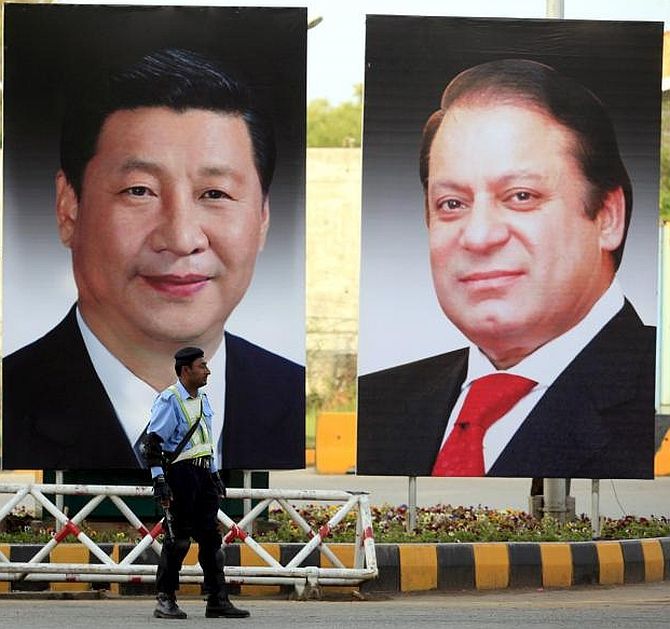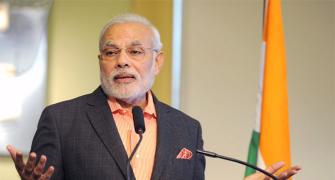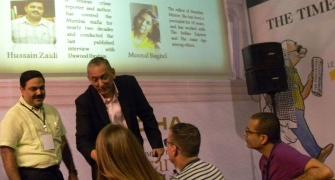'It would not be incorrect to say that the Chinese-Pakistani strategy of containing India began in the aftermath of the 1965 war,' the legendary K Subrahmanyam noted on Rediff.com 10 years ago.

Though the 1965 Indo-Pak war was only a medium-scale, limited war that lasted less than three weeks, it resulted in the Tashkent Agreement that brought about exchange of territories occupied by both sides.
It is largely seen as a stalemate in Pakistan and the rest of the world, but the 1965 war generated very significant consequences that decided the fate of the Indian subcontinent.
The Pakistani leadership carefully planned the war. It was meant to lead to a massive uprising in Kashmir engineered by sending in Pakistani infiltrators.
Further, by clandestinely raising a second armoured division of relatively sophisticated Patton tanks, Pakistan aimed at a breakthrough in Punjab against the weak and obsolete Indian armour and wanted to cut off Jammu and Kashmir from India.
Field Marshal Ayub Khan also was planning to demonstrate -- in the wake of the Indian Army's debacle at Sela-Bomdila in Arunachal Pradesh in November 1962 -- that one Pakistani was equal to 10 Indians in terms of military prowess.
His conviction was that the Hindu, when struck a timely and decisive blow, would not be able to stand up. His confidant Altaf Gauhar has recorded this in Ayub Khan's biography.
Pakistan had China's support. When Islamabad appealed for support, Beijing did try to apply pressure on New Delhi by delivering a not very credible ultimatum to India.
The Americans were well informed about the possibility of Pakistani infiltration into Kashmir and the subsequent offensive months in advance, as has been recorded by the then Central Investigative Agency operative in India, Duane Claridge, in his book A Man for All Seasons.
The American military and political establishment had concluded that in case of a war, Pakistan would win.
The Pentagon and Harvard University played a war game at the Institute of Defence Analysis, Washington, DC, in March 1965. The war game and its results were available in a book, Crisis Game by Sidney Giffin, by the spring of 1965.
The total failure of the Kashmir uprising, the complete destruction of the Pakistani Patton Armoured division at Khem Karan in Punjab and the Pakistan army running out of ammunition and being saved from total humiliation through the UN ceasefire constitute a turning point in the history of India-Pakistan relations.
Having engineered the war and seen it result in a disaster, Zulfikar Ali Bhutto turned against his benefactor Ayub Khan and blamed him for the Tashkent Agreement. His propaganda was that Ayub Khan threw away a military victory.
The Pakistani people were not informed about the failure of Operation Gibraltar, the attempted infiltration into Kashmir and thereafter of Operation Grand Slam, the attack on Jammu.
The Indian counter-attack in the Lahore sector was depicted as Indian aggression. The decimation of the Pakistani armoured division by a poorly armed Indian armoured brigade through superior tactics at Khem Karan was also not told to the Pakistani people.
But all these attempts at obfuscation did not deceive a leader like Sheikh Mujibur Rahman, considered the father of Bangladesh. When the question was raised about the security of what was then East Pakistan vis-a-vis India in case of another war, Bhutto, as foreign minister, implied in his answer that Pakistan depended on Beijing to ensure the security of that part of its territory.
That led Rahman to ask for greater autonomy from Islamabad and to formulate his six points which became the basis for the subsequent secession of Bangladesh from Pakistan.
The 1965 war also led to an embargo of US arms supplies to Pakistan. Islamabad's use of American arms against India was against the assurances given by President Dwight Eisenhower to Jawaharlal Nehru that in case Pakistan used US-supplied arms against India, necessary corrective action would follow.
Though the US bureaucracy and the Pentagon were prepared to look the other way if Pakistan had won the war, they found it difficult to overlook the miserable performance of Pakistani armour at Khem Karan. Pakistan therefore turned to China and France for re-equipment of its forces. After 1965, China became the foremost supplier of arms to Pakistan.
From Bhutto's death cell testimony, it also becomes clear that Pakistan initiated its discussions with China on acquiring nuclear weapon technology around 1965. Bhutto talked of completing his 11-year-long negotiations successfully in 1976.
It would not be incorrect to say that the Chinese-Pakistani strategy of containing India began in the aftermath of the 1965 war.
Pakistan drew correct lessons from the failure of Operation Gibraltar when the Kashmiris did not rise against India in consequence to large-scale infiltration of Pakistani commandos into the Kashmir valley. They bided their time and in the late 1980s trained disaffected Kashmiris, who crossed over into Pakistan occupied Kashmir, in arms and infiltrated them back.
That this strategy too did not wholly succeed is a different story, but it did begin the prolonged proxy war against India in Kashmir.
Pakistan also discovered it was not difficult to run rings around the conditions of American arms supplies and hide things from US inspection teams. They were able to covertly raise a second armoured division in 1965. Unfortunately for them it did not give them the victory in Punjab they expected. The second armoured division met its defeat at Khem Karan.
Pakistan used this experience of getting around US procedures in the 1980s to divert American arms -- meant for Afghans fighting Soviet forces -- to arm the various jihadi militias and to install the Taliban regime in Kabul.
On the Indian side too, the 1965 war led to significant results. The Indian Army failed to assess intelligence effectively in respect of construction of aqueducts under the Ichogil canal (that runs from India to Lahore) and on Pakistan covertly raising a second armoured division.
Thus, the external and internal intelligence collection and reporting were bifurcated. A dedicated external intelligence agency -- the Research and Analysis Wing -- was created.
An ill-advised reorganisation proposal in respect of Indian armour -- increasing light armour and reducing medium armour -- strongly espoused by General Joyanto Nath Chaudhuri before the war, was given up. The Indo-Soviet arms supply relationship got reinforced and the Soviet Union became the sole supplier of arms for India.
Though it is not much written about, India intensified its support to Sheikh Mujibur Rahman and his Awami League in their demands for greater economy from Islamabad.
The 1965 war demonstrated that the 1962 debacle was not a reflection on the Indian Army, but was the result of inadequacies in a few top inexperienced generals. It also proved that Indian unity was solid while Pakistan was vulnerable to divisive forces. It brought out that American short-term Cold War calculations overrode Washington's commitment to democracy.
It also highlighted that the US establishment had very wrong assessments about the Indian leadership, the Indian Army and India's ability to survive as a Union and grow into a major power.
The legendary K Subrahmanyam was the doyen of India's strategic thinkers. This article was first published on Rediff.com on September 6, 2005.
OUR SPECIAL SERIES: THE 1965 WAR, 50 YEARS LATER
- Pakistan should never consider India weak
- 'When we fight a war we forget the danger'
- A grateful nation and a proud school
- The Hero of the Battle of Dograi
- Asal Uttar, the battle that turned the tide of the 1965 war
- Param Vir Chakra Abdul Hamid, a Hero's Hero
- My Father, the Param Vir Chakra Winner
- The daredevil fighter pilot who survived a Pakistani bullet
- My salute to arguably India's greatest military hero
- Two wars and a romance
- The war that helped India regain its military confidence
- The central lesson from the '65 war
- The general who saved Punjab in the '65 war









